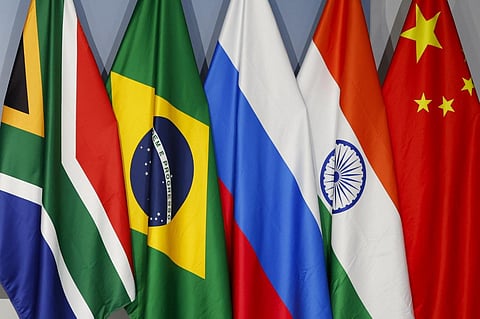

BRICS leaders announced on Thursday the admission of six new countries from next year as the club of large and populous emerging economies seeks to reshape the global order.
The BRICS -- Brazil, Russia, India, China and South Africa -- agreed at their annual summit to make Argentina, Ethiopia, Iran, Saudi Arabia, Egypt and the UAE full members from January 1.
"This membership expansion is historic," said Chinese President Xi Jinping, whose nation is the most powerful in the group of non-Western states that represents a quarter of the world's economy.
"The expansion is also a new starting point for BRICS cooperation. It will bring new vigour to the BRICS cooperation mechanism and further strengthen the force for world peace and development."
Ethiopian Prime Minister Abiy Ahmed hailed what he called "a great moment" for his country.
"Ethiopia stands ready to cooperate with all for an inclusive and prosperous global order," he said on X, formerly known as Twitter.
In Iran, senior presidential advisor Mohammad Jamshidi described the move as a "historic development and a strategic success" for Tehran's foreign policy.
Calls to enlarge the BRICS had dominated the agenda at its three-day summit in Johannesburg and exposed divisions among the bloc over the pace and criteria for admitting new members.
But the group, which makes decisions by consensus, had agreed on "the guiding principles, standards, criteria and procedures of the BRICS expansion process", said South African President Cyril Ramaphosa.
Nearly two dozen countries had formally applied to join the club from across the "Global South", a broad term referring to non-Western nations.
Some 50 other heads of state and government attended the summit, underscoring what BRICS leaders say is the attractiveness of its message.
Rising clout
US officials have played down the likelihood of BRICS emerging as a geopolitical rival, describing the bloc as a highly diverse collection of countries containing both friends and rivals.
The BRICS are a disparate mix of big and small economies, democratic and authoritarian states, and the candidates seeking membership and those admitted to the club also reflect this variety.
But despite differences, BRICS leaders expressed a common belief that the international system was dominated by Western states and institutions and was not serving the interests of developing nations.
Brazilian President Luiz Inacio Lula da Silva said with the admission of six new members, the bloc now represented 46 per cent of the world's population and an even greater share of its economic output.
The summit underlined divisions with the West over the war in Ukraine, and the support Russia enjoys from its BRICS partners at a time of global isolation.
South Africa, China and India have not condemned Russia's invasion while Brazil has refused to join Western nations in sending arms to Ukraine or imposing sanctions on Moscow.